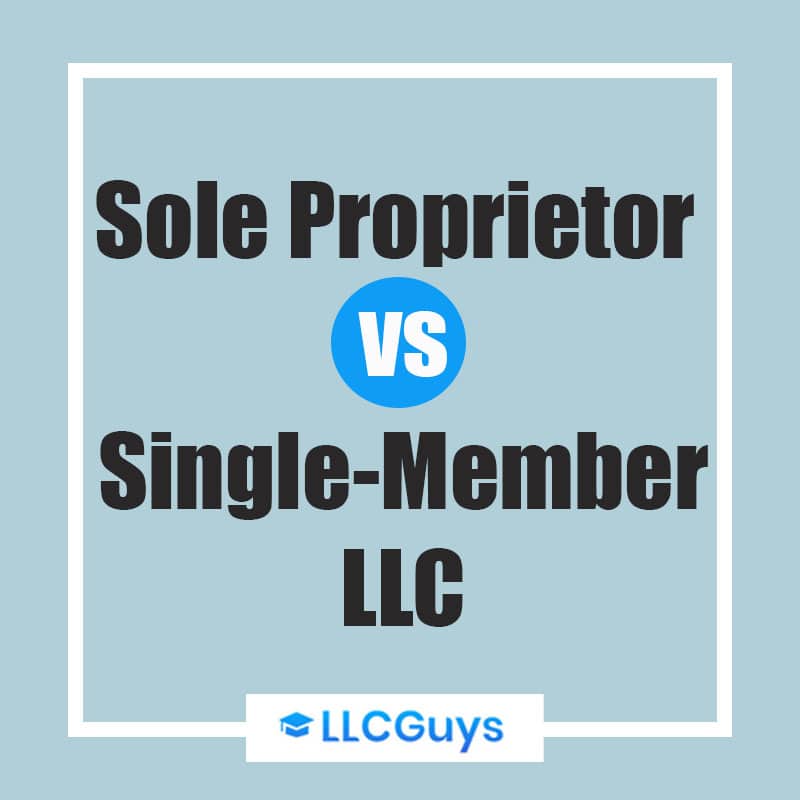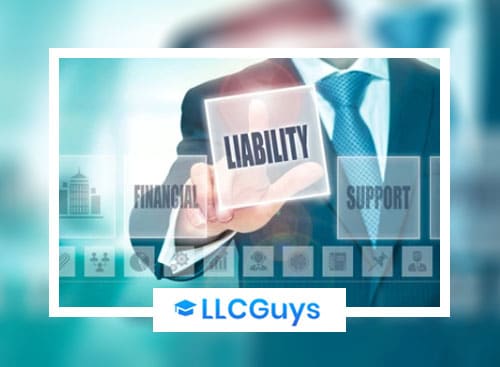Sole Proprietor vs. Single-member LLC (Main Differences, Pros & Cons)
Jump to Top-2 SMLLC Creation Services

The main distinction between a sole proprietorship and a single-member LLC is that in a sole proprietorship, the owner and the sole proprietorship are one and the same, whereas, in an LLC, there is a distinct divide between the owner and the business entity when it comes to legal and tax matters. A single-member LLC is essentially the same as an LLC except for the fact that it only has one member.
Many small businesses end up being a sole proprietorship because they don’t register with the state, but if you do register with the state, then a separation between the SMLLC and its owner forms, which offers protection from the liability of the company. The SMLCC can then be taxed as a corporation.
- Jump to Top-2 SMLLC Creation Services
- Choosing Your Business Entity (SMLLC or Sole Proprietor?)
- What is A Single Member LLC?
- Main Advantages and Disadvantages Between SMLLC and Sole Proprietorship
- Main Similarities Between SMLLC and Sole Proprietorship
- Setting Up the Business
- Personal Liability
- Ongoing Business Compliance
- Income taxes
- So Is SMLLC or Sole Proprietorship Righ For You?
- Best Legal Help for LLC Creation
- FAQs
Choosing Your Business Entity (SMLLC or Sole Proprietor?)
A sole proprietorship and a single member LLC are both popular business structures. Before starting a business, it is important to work out what type of business entity will be best suited for you and your needs. This can be achieved by looking at the pros and cons of each, and understanding the main differences. One of the best ways to make your decision is to look at the differences from multiple angles, such as the personal liability, business taxes, ownership, and control of the business to name a few.
What is A Single Member LLC?
An LLC is one of the most popular types of small business across all states. A single-member LLC is an LLC that is run by, as the name suggests, a single owner. It is a business entity that is registered to the state of formation. Although it is only run by one owner, it has all the same advantages and disadvantages as a multi-member LLC.
Main Advantages and Disadvantages Between SMLLC and Sole Proprietorship
Pros & Cons of Sole Proprietorship
Pros
Cons
Pros & Cons of Single-member LLC
Pros
Cons
Main Similarities Between SMLLC and Sole Proprietorship
Although they are both very different business types, there are still some similarities between the two.
Both business types are required to report any income and expenses on Schedule C of Form 1040. The net income from both will be taxable. It is very important that the business owner maintain records of any income and expenses, so that you can take any deductions that you are entitled to. These can include expenses such as mileage for business travel, meals while travelling for business, home office expenses, and health insurance to name a few.
In both cases, if the business has any employees then a tax payer identification number needs to be acquired, and the business owner has to withhold and pay payroll taxes. You must also be aware of all business obligations regardless of which business type you choose, which include all licenses and permits.
Setting Up the Business

Sole proprietorship
If an entrepreneur sets up a business that contains their first and last names somewhere in the business name, then they don’t have to register their name with the state, which makes the setup process very easy. One of the only requirements are that in some states, a business owner is required to run an advert in a newspaper to let the public know who is conducting the business.
Single Member LLC
Setting up an LLC is a lot more time-consuming, as you have to register with the state in which you are conducting business. A document called the Articles of Organization is required, which are not too hard to fill out but, if you don’t want to do it yourself, you can hire a third party to file the Articles of Organization for you. At this point, the business name also needs to be registered.
Both
Both types of business entities will be required to obtain an EIN, which is needed to open a business bank account, hire employees and various other business related tasks. Depending on the state, both will also have to apply for any necessary licenses and permits, and if the business has any employees, they will have to withhold the payroll taxes from the employees’ salaries.
Personal Liability

Sole Proprietorship
There is no legal separation between the business owner and the company in a sole proprietorship, which many people try to avoid. In the eyes of the state, they are one legal entity, which means that the business owner is completely responsible for all the legal obligations and debts of the business. Therefore, if the business runs into some trouble and can’t pay the bills, or if the business gets sued, then the individual business owner will be responsible for this. If it comes down to it, it may even mean that the business owners’ personal assets might be taken as restitution.
Single-member LLC
An LLC is its own business entity, which means it is legally detached from the business owner, removing that element of personal liability. If any legal action is taken against the business, or it has any debt, then the business owner is not held personally responsible, unless of course, they have engaged in wrongful business activities.
Ongoing Business Compliance

Sole Proprietor
If you want an easy life after setting up a business, then a sole proprietorship is the way to go. In fact, it is one of the easiest business types when it comes to an administration standpoint. There are basically no corporate compliance formalities that you need to abide by, as the state does not recognize it as a separate legal entity.
Single-member LLC
There is a bit more ongoing business compliance when it comes to a Single Member LLC. The requirements depend on where the LLC is based, but there is still not too much compliance to worry about. In general though, the basic requirements may include filing an annual report with the state, although some states may only require this every 2 years, paying business taxes and recording the major changes that take place in your LLC to the state, which is achieved by filing an Articles of Amendment.
Income taxes

Sole Proprietorship
The business owner and the business itself are one and the same in a sole proprietorship, so that means that they are also the same tax paying entity. A sole proprietorship uses a method called pass-through taxation, which means that the income tax obligations of the business is conducted through the owner’s personal tax return.
Single-member LLC
If an LLC meets all eligibility requirements, they can choose to either be taxed as a C Corporation or an S Corporation. With C tax treatment, the business income will get taxed at the corporate tax rate and the business can file a separate tax return. With the S Corp option, then income tax is reported on the business owner’s personal income tax return. Most LLCs will lean towards the C Corp option.
So Is SMLLC or Sole Proprietorship Righ For You?
There is a lot to consider when it comes to what sort of business type is right for you and your needs. You have to weigh up the advantages and disadvantages of both. In general, it will cost you a bit more to set up and run an LLC when compared to a sole proprietorship, but in some cases, the slightly higher price tag might be worth it.
Learn as much as possible about each type of entity before making your decision, and it even may be worth seeking professional guidance from either a tax advisor or an attorney.
In general, a sole proprietorship is usually a good option for those that want to run a low-risk business, and are just starting out in the industry. It is a good way to first test out a business idea before looking into other, more formal entity formation options. A single-member LLC on the other hand is often chosen but that that has a little bit more of a high-risk business, as the owner’s assets will be protected.
Best Legal Help for LLC Creation
As forming an LLC is a little more complicated than a sole proprietorship, some people may not be comfortable with forming it by themselves. There are lots of companies out there that can help. Here are my favorite and best-rated 2 companies that can form a Single-member LLC for you, completely hassle-free:
#1: ZenBusiness
Zenbusiness is one of the most popular choices when it comes to LLC formation, and this can be pinned down to a number of reasons. They are one of the most affordable options available, with the ability to form an LLC for under $50, which is a lot cheaper than many of its competitors. For this cheaper price tag, businesses still get everything they need and more to successfully form an LLC, as well as a registered agent for a whole year included in the price. The customer experience is very good, with a helpful customer service team and very few upsells. If you look online, there are literally hundreds of positive reviews available to read about Zenbusiness, which helps to give individuals peace of mind. In addition to LLC formation, customers also have the option to go with a number of premium packages which come with other helpful extras such as business websites, business email address, and other ongoing business maintenance issues. If interested, you can also check out our full ZenBusiness review here.
#2: IncAuthority
Another popular choice is IncAuthority, which is actually even cheaper than Zenbusiness as they have a ‘free’ plan. All you have to pay is the mandatory secretary of state fees. The company makes its money if the business owner chooses to subscribe to any additional services. In the free plan, you’ll get a business name search, document preparation and filings, free registered agent services for a year, and a number of other services. The company has helped to form literally thousands of businesses since its beginnings, and has some great customer feedback, with thousands of reviews available online, the majority of which are very positive. If you did want to go with one of the paid plans, you should be prepared to pay quite a hefty fee.
If you want to know more — here’s a full review of IncAuthority as well.
FAQs
Where should I form an LLC?
There are lots of things to consider when deciding where to form an LLC, including costs and where you want to conduct business. Most people prefer to file their LLC where they are doing their business, while other people choose a different state, as different states come with different advantages and costs.
Does your business name need to be registered?
State regulations require LLCs to register a business name which is in accordance with state guidelines. Sole proprietors don’t have the same requirements.
Can you mix business funds with personal finances?
From a legal standpoint, sole proprietors don’t have to worry about mixing business and personal accounts, as they are regarded as the same entity, although this is discouraged. As an LLC, banking records and funds must be kept separate.





